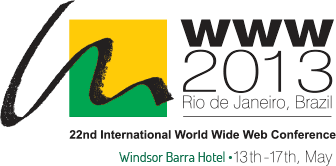Semantic Web
The Web has been evolving as a globally pervasive backbone for data and information dissemination. This track focuses on the web with a semantic component. Semantic technologies have evolved as enablers for the current and next generation of increasingly intelligent applications and services. This track focuses on all aspects of semantics in the web.
We invite original contributions on topics related to the Semantic Web, including (but not limited to) the ones below.
Topics
- Linked Data on the Web as well as in the enterprise
- RDF stores and repositories
- RDF data publishing and access
- Provenance languages and infrastructures for linked data
- Explanation of semantic web applications and services
- Querying and searching Semantic Web Data, including hybrid combination approaches
- Methods for linking, integrating and federating Data on the Web
- Semantic annotation and metadata
- Community and social mechanisms for the definition of semantics of data, and metadata and
ontology creation - Ontologies, Reasoning and representation languages (such as OWL), as they pertain to Web
needs - Ontology environments
- Re-purposing of data, information, and multimedia using semantics
- Applications of Semantic Web formats for enterprises, learning and science
- Other novel applications that exploit structured Web data sources
- Blogs, wikis, browsers, crawlers, harvesters, content management systems, search engines and
other applications that produce and consume Semantic Web Data - Mobile and ubiquitous applications exploiting semantics
- User interfaces for interacting with Semantic Web Data
- Methodologies for the engineering of Semantic Web applications
Track Chairs
- Steffen Staab (U of Koblenz)
- Deborah McGuiness (RPI)
TPC Members
- Axel Polleres (Siemens AG Österreich / DERI, National University of Ireland, Galway)
- Boris Motik (University of Oxford)
- Christian Bizer (Freie Universität Berlin)
- Claudia D’Amato (Computer Science Department – University of Bari)
- Claudio Gutierrez (Universidad de Chile)
- Daniel Schwabe (Dept. of Informatics, PUC-Rio)
- Elena Simperl (KIT)
- Evelyne Viegas (Microsoft Research)
- Frank Van Harmelen (Vrije Universiteit Amsterdam)
- Gerd Gröner (University of Koblenz)
- Hans Akkermans (VU University Amsterdam)
- Haofen Wang
- Harith Alani (KMi, The Open University)
- Hasan Davulcu (Arizona State University)
- Jeff Heflin (Lehigh University)
- Jeff Z. Pan (University of Aberdeen)
- Jérôme Euzenat (INRIA & LIG)
- Jihie Kim (Information Science Institute)
- Li Ding (Rensselaer Polytechnic Institute)
- Lora Aroyo (VU University Amsterdam)
- Luciano Serafini (Fondazione Bruno Kessler)
- Manfred Hauswirth (Digital Enterprise Research Institute (DERI), Galway)
- Manolis Koubarakis (National and Kapodistrian University of Athens)
- Markus Strohmaier (Knowledge Management Institute – Graz University of Technology)
- Markus Krötzsch (University of Oxford)
- Mathieu D’Aquin (Knowledge Media Institute, the Open University)
- Mike Dean (Raytheon BBN Technologies)
- Natasha F. Noy (Stanford University)
- Olaf Hartig (Humboldt-Universität zu Berlin)
- Pascal Hitzler (Kno.e.sis Center, Wright State University, Dayton, Ohio)
- Patrice Seyed
- Paul Buitelaar (DERI – National University of Ireland, Galway)
- Peter Patel-Schneider (Self)
- Philipp Cimiano (University of Bielefeld)
- Philippe Cudré-Mauroux (U. of Fribourg)
- Rudi Studer (Karlsruher Institut für Technologie (KIT))
- Sören Auer (TU Chemnitz)
- Thanh Tran (Institute AIFB)
- Tim Finin (UMBC)
- Volker Tresp (Siemens AG, CT IC 4, Munich)
- Ying Ding (Indiana University)



















